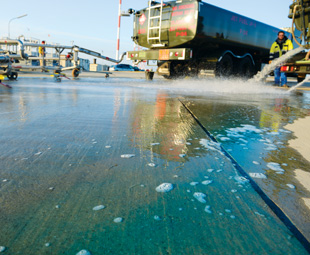Not a small spill

A hazchem spill can lead to very severe environmental damage, which can bankrupt a transport company. MARISKA MORRIS investigates ways to minimise harm if a spill does occur
Safety planning requires taking a worst-case scenario into account. In May 2015, in Limpopo province, a truck overturned and spilled 28 000 litres of sulphuric acid into the Nyl River. The pollution caused fish to die, farmers halted irrigation and were forced to move their livestock, while residents living ten kilometres downstream were warned not to use the water.
“Waste such as milk, run-off water containing food waste, oil and fuel can be serious enough to cause damage,” says Morné Stoltz, head of business insurance and broker distribution at MiWay.
Companies can be held liable for spills resulting from employee negligence. “Even if the pollution is caused by contractors; a company can still be held liable,” notes Stoltz. The most obvious safety precaution is to ensure the company has environmental insurance, especially when transporting hazardous materials.
“This form of insurance covers the costs incurred through clean-up and rehabilitation in the event of an environmental incident,” Stoltz points out. Not having insurance can result in the financial demise of a company, due to the high cost of clean-up operations or legal fees.
Another preventative measure companies should consider is investing in a spill kit. “The South African National Standard (SANS) 1186 stipulates that transporters working with a hazmat product must ensure that every proactive measure is taken to prevent a spill. In the event of a spill occurring, a company needs to ensure the proper management of the spill,” says Salika Singh, sales and marketing consultant at AfriSupply.
With a spill kit, the truck driver is able to contain the spilled material. “Having a spill kit on hand enables the drivers to quickly respond to de-risking and blocking off hazmat spillages to prevent them entering storm-water drains or rivers. This greatly reduces the risk, cost and impact on both the environment and the public,” Singh notes.
These kits cannot, however, be used for the actual clean-up of the spill, as most trucks carry tonnes of hazmat materials. There are various spill kits available for different materials ranging from oils and fuels, bodily fluids and biological waste, to mercury and glass shards.
Kits come in various sizes and contain a variety of equipment, including the correct absorbents for the specific material. Truck or tanker spill kits from AfriSupply range in size from 25 to 75 litres. The smaller kits are compact and can be kept inside the cab with the driver.
Other larger spill kits – such as the 240-litre Universal Wheelie Bin Spill Kit, which comes with a bin and broom – are more suited to factories or warehouses. It is also possible to buy refills for the spill kits.
Insurance and a good spill kit will not prevent a spill, but they can contain the cost to the company as well as to the environment.
Published by
Focus on Transport
focusmagsa



 Big news from FOCUS on Transport + Logist
Big news from FOCUS on Transport + Logist


 !
Starting 1 April, every
!
Starting 1 April, every


 FUSO: Driving the Future of Mobile Healthc
FUSO: Driving the Future of Mobile Healthc



 A brand
A brand




 Wondering about the maximum legal load for a
Wondering about the maximum legal load for a 
 The MAN hTGX powered by a hydrogen combus
The MAN hTGX powered by a hydrogen combus

 Exciting News for South African Operators
Exciting News for South African Operators


